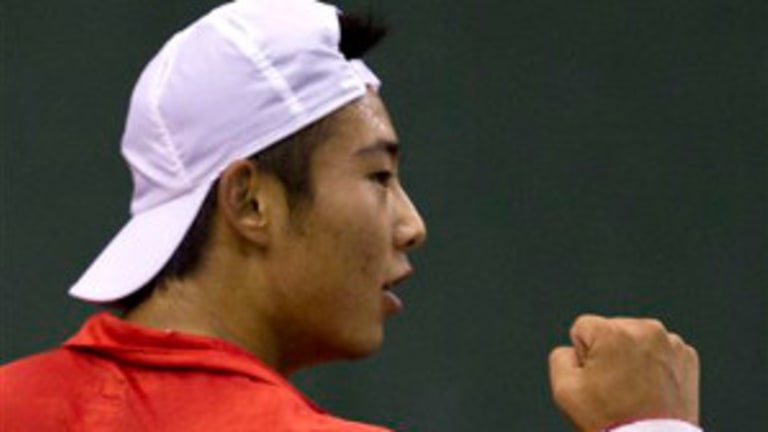NEW YORK—The success of Chinese women in recent years often raised the question: What about the Chinese men? How come the ATP tour doesn’t have three, four, or five Chinese players who regularly appear in the main draw at the majors?
The topic is a little too broad to broach here, but I can tell you that Chinese men are likely to be a presence soon, even if its two best players, Ze Zhang and Di Wu, are currently both outside the Top 150 (Nos. 182 and 271, respectively). But even if the men are unlikely to knock Li Na off the front pages of China's newspapers, progress is definitely being made.
Both Ze and Di were assigned 11 a.m. matches at the U.S. Open qualifying tournament this year, so I went out to take a look this morning. When I arrived at Court 12, Di was already up a break on Josselin Ouanna of France, a 6’4” specimen whose talent still must be described as “raw,” even though the clock is ticking on the 27-year-old’s career.
By contrast, Di is just 21, but he’s handicapped by his stature. He’s just 5’8” and weighs about as much as one of Ouanna’s thighs. Big men are inexorably taking over tennis, even if select little guys have persistently popped up to make life difficult for the specimens. So Di has his work cut out.
Craig Kardon, a former coach of Martina Navratilova and Shahar Peer (among others) and current mentor of Ze, calls Di “a poor man’s Michael Chang”—and don’t mistake that for an insult. Stroke production-wise, Di is a little Mats Wilander-ish: A smooth player with beautifully grooved strokes.
Despite his short stature, Di’s got decent pop on his serve and he already seems to know how to compete. A few weeks ago, he upset his countryman Ze in the men’s singles final of China’s National Games.
Today—another torrid, humid one in Queens—Di won the first set with ease, and he broke Ouanna for a 2-0 lead in the second set. At that point, a British coach paused for a moment behind me and crisply said to the protégé trailing him: “That’s Ouanna. Big serve. Big forehand. No backhand—plays slice a lot. Inconsistent.”
I can’t do any better than that, so let’s cut to the chase: Di won easily, 6-4, 6-1. By then, I’d traveled the distance of a decent topspin lob to Court 15, where Ze was playing. He’d already lost the first set when I slid along the bench to sit alongside Kardon, whom I’ve known for a long time. Ze had lost the first set, 6-3, but was leading Austria’s Martin Fischer in the second set, 3-1. “The first set was a disaster,” Kardon whispered. “He was down love-four before he even woke up.”
A moment later, Kardon called out, “Come on, George. Focus!” How “Zhang” morphed into “George” is beyond me, but for what it’s worth, Kardon later explained that, as a matter of fact, his official nickname is “Big George.”
Unlike Di, Big George is prime meat on the hoof, 6’2” with smoothly muscled legs and broad shoulders capable of generating excellent racquet-head speed and a vicious kick serve. Like every Chinese player I’ve watched, his ground-strokes are a model of discipline; there’s nothing exaggerated about them, which helps explain why he, like the more accomplished Li, can really brush the net and skim the lines with deadly, flat lasers. Ze used those aggressive shots to upset Richard Gasquet in the China Open last October, after which Gasquet said: “He’s a talented player, he’s aggressive and fast.”
Not on this day, though. Kardon put the slow start by Big George down to lack of match play. Kardon and Ze had arrived from China at around midnight on Saturday, which gave the 23-year-old exactly two days of practice before his match. Further, I was surprised to hear that Ze’s preparation for the qualifying tournament consisted of stowing his racquets in the closet and taking two weeks off.
